Analyzing the AASW Code of Ethics: Personal Judgement vs. Guidelines
VerifiedAdded on 2022/09/08
|8
|1720
|17
Essay
AI Summary
This essay critically analyzes the statement that a professional code of ethics negates the need for personal judgment, allowing professionals to hide behind rules. The author argues against this perspective, emphasizing that ethical codes provide guidance but do not replace the need for social workers to exercise their own judgment, particularly when facing ethical dilemmas. The essay discusses the importance of consequentialism, virtue ethics, and the ethics of care in navigating complex situations. It highlights scenarios where adherence to the code alone might lead to negative outcomes, underscoring the need for critical thinking and the application of personal values. The author concludes that the code of ethics serves as a valuable framework, but informed decisions require a blend of ethical principles and individual assessment. The essay also explores the responsibilities of social workers towards their profession and the importance of making ethically correct decisions based on the consequences of their actions.
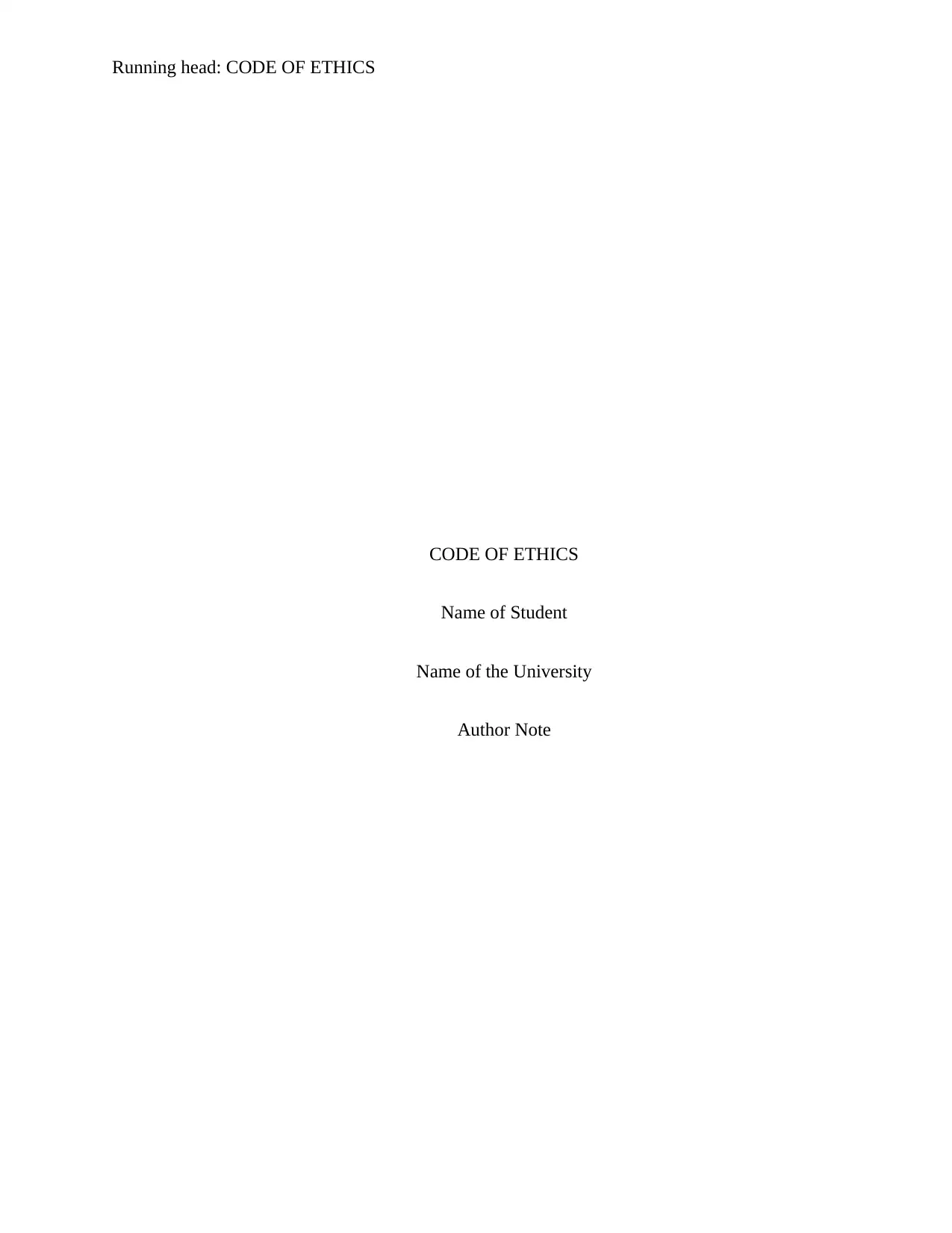
Running head: CODE OF ETHICS
CODE OF ETHICS
Name of Student
Name of the University
Author Note
CODE OF ETHICS
Name of Student
Name of the University
Author Note
Paraphrase This Document
Need a fresh take? Get an instant paraphrase of this document with our AI Paraphraser
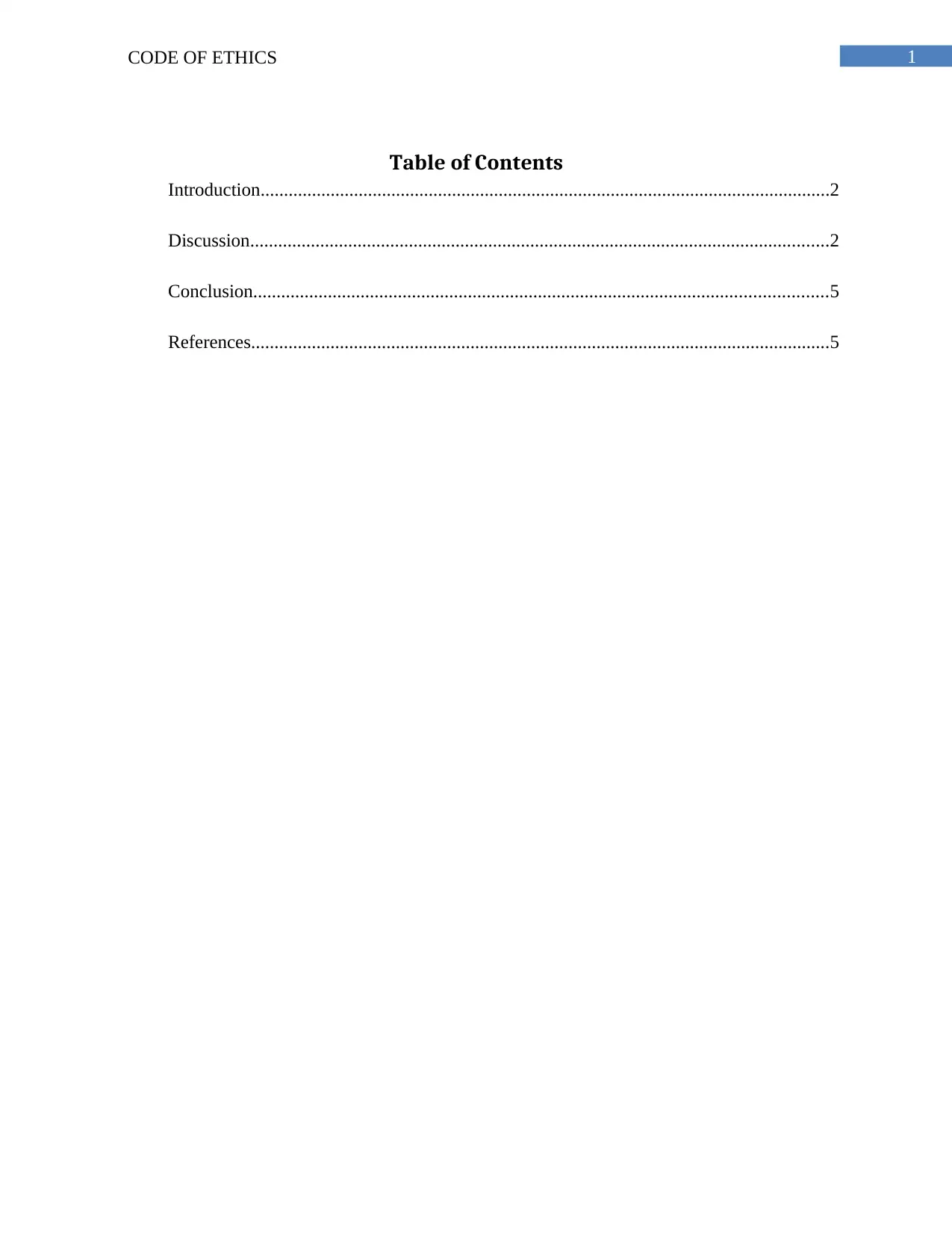
1CODE OF ETHICS
Table of Contents
Introduction..........................................................................................................................2
Discussion............................................................................................................................2
Conclusion...........................................................................................................................5
References............................................................................................................................5
Table of Contents
Introduction..........................................................................................................................2
Discussion............................................................................................................................2
Conclusion...........................................................................................................................5
References............................................................................................................................5
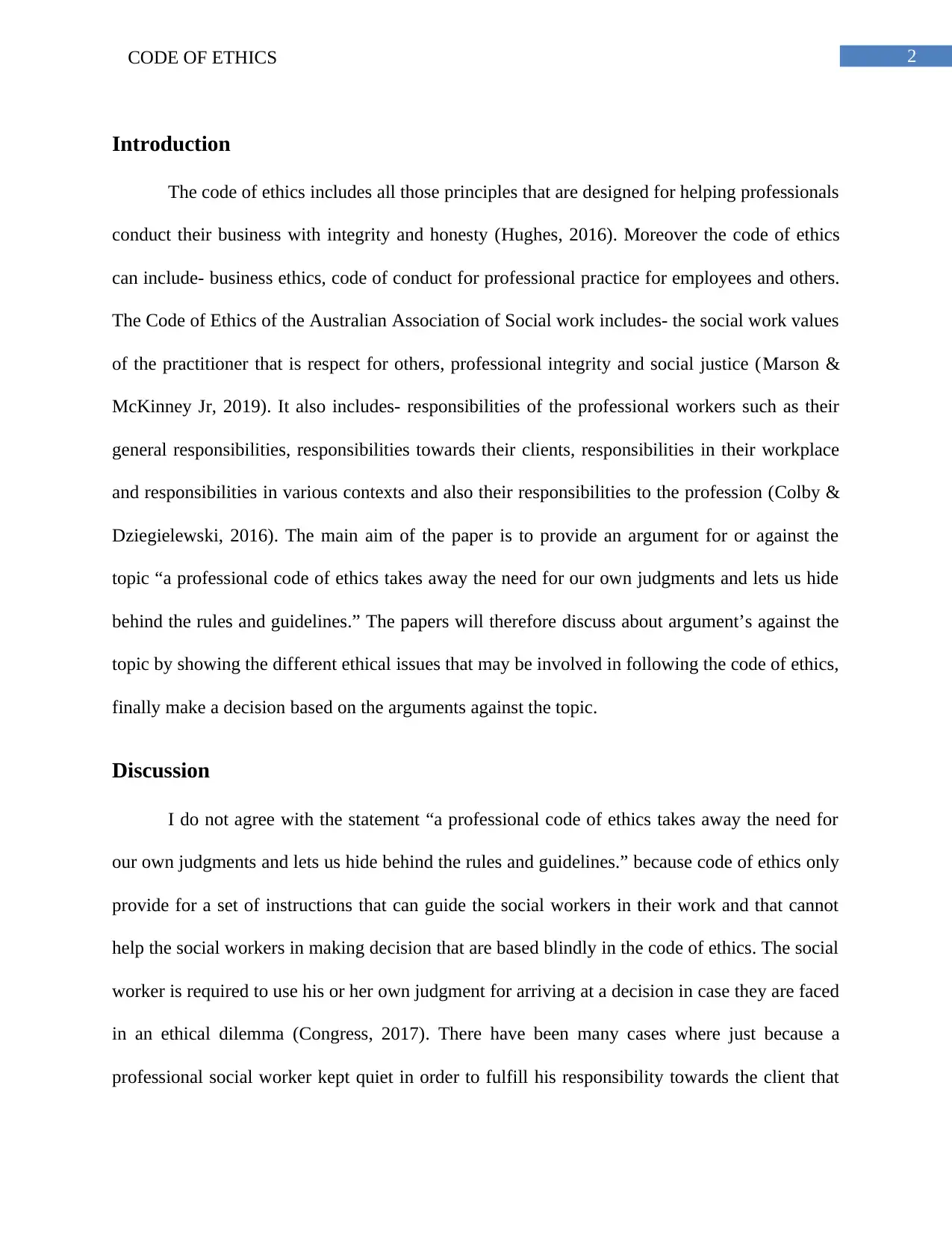
2CODE OF ETHICS
Introduction
The code of ethics includes all those principles that are designed for helping professionals
conduct their business with integrity and honesty (Hughes, 2016). Moreover the code of ethics
can include- business ethics, code of conduct for professional practice for employees and others.
The Code of Ethics of the Australian Association of Social work includes- the social work values
of the practitioner that is respect for others, professional integrity and social justice (Marson &
McKinney Jr, 2019). It also includes- responsibilities of the professional workers such as their
general responsibilities, responsibilities towards their clients, responsibilities in their workplace
and responsibilities in various contexts and also their responsibilities to the profession (Colby &
Dziegielewski, 2016). The main aim of the paper is to provide an argument for or against the
topic “a professional code of ethics takes away the need for our own judgments and lets us hide
behind the rules and guidelines.” The papers will therefore discuss about argument’s against the
topic by showing the different ethical issues that may be involved in following the code of ethics,
finally make a decision based on the arguments against the topic.
Discussion
I do not agree with the statement “a professional code of ethics takes away the need for
our own judgments and lets us hide behind the rules and guidelines.” because code of ethics only
provide for a set of instructions that can guide the social workers in their work and that cannot
help the social workers in making decision that are based blindly in the code of ethics. The social
worker is required to use his or her own judgment for arriving at a decision in case they are faced
in an ethical dilemma (Congress, 2017). There have been many cases where just because a
professional social worker kept quiet in order to fulfill his responsibility towards the client that
Introduction
The code of ethics includes all those principles that are designed for helping professionals
conduct their business with integrity and honesty (Hughes, 2016). Moreover the code of ethics
can include- business ethics, code of conduct for professional practice for employees and others.
The Code of Ethics of the Australian Association of Social work includes- the social work values
of the practitioner that is respect for others, professional integrity and social justice (Marson &
McKinney Jr, 2019). It also includes- responsibilities of the professional workers such as their
general responsibilities, responsibilities towards their clients, responsibilities in their workplace
and responsibilities in various contexts and also their responsibilities to the profession (Colby &
Dziegielewski, 2016). The main aim of the paper is to provide an argument for or against the
topic “a professional code of ethics takes away the need for our own judgments and lets us hide
behind the rules and guidelines.” The papers will therefore discuss about argument’s against the
topic by showing the different ethical issues that may be involved in following the code of ethics,
finally make a decision based on the arguments against the topic.
Discussion
I do not agree with the statement “a professional code of ethics takes away the need for
our own judgments and lets us hide behind the rules and guidelines.” because code of ethics only
provide for a set of instructions that can guide the social workers in their work and that cannot
help the social workers in making decision that are based blindly in the code of ethics. The social
worker is required to use his or her own judgment for arriving at a decision in case they are faced
in an ethical dilemma (Congress, 2017). There have been many cases where just because a
professional social worker kept quiet in order to fulfill his responsibility towards the client that
⊘ This is a preview!⊘
Do you want full access?
Subscribe today to unlock all pages.

Trusted by 1+ million students worldwide
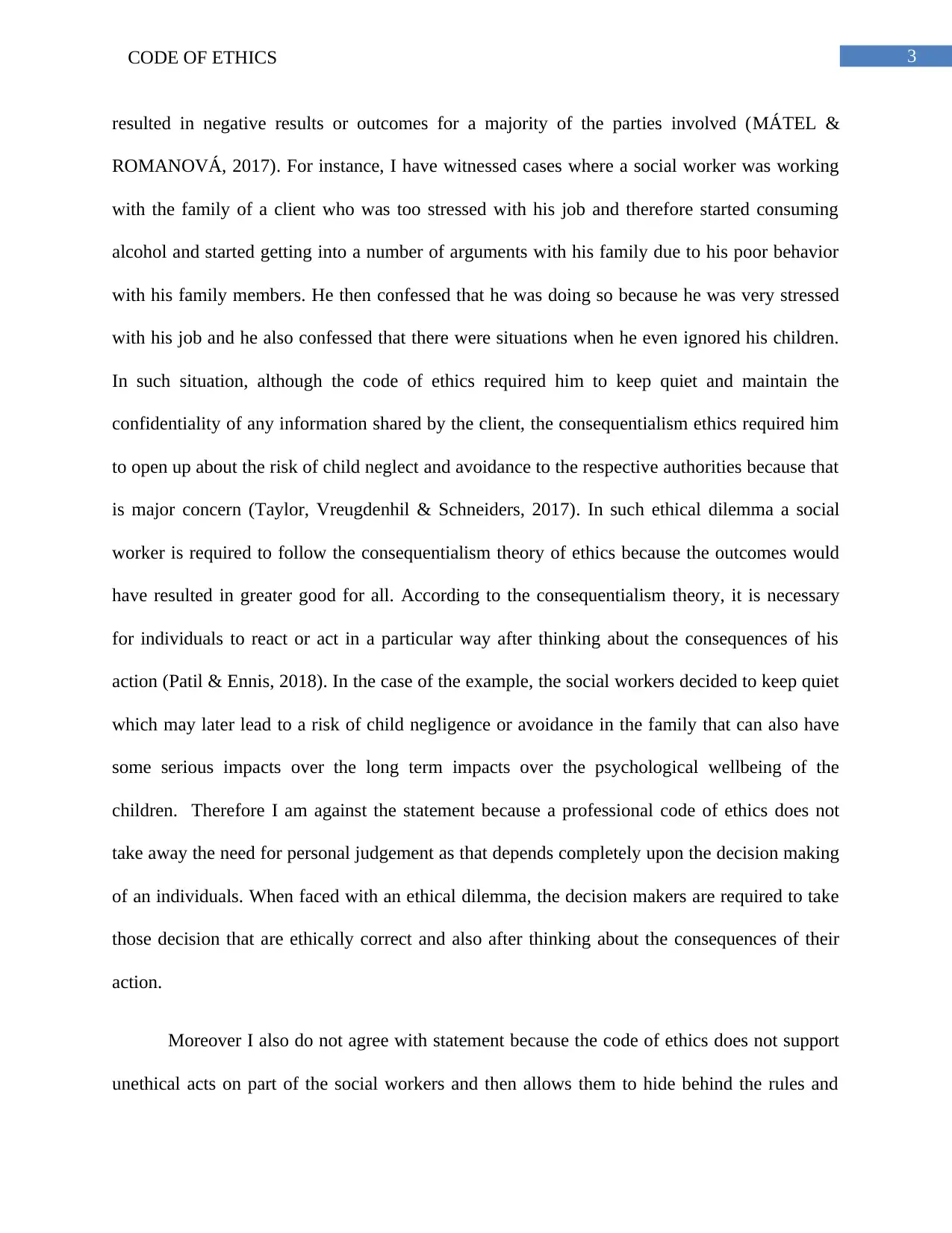
3CODE OF ETHICS
resulted in negative results or outcomes for a majority of the parties involved (MÁTEL &
ROMANOVÁ, 2017). For instance, I have witnessed cases where a social worker was working
with the family of a client who was too stressed with his job and therefore started consuming
alcohol and started getting into a number of arguments with his family due to his poor behavior
with his family members. He then confessed that he was doing so because he was very stressed
with his job and he also confessed that there were situations when he even ignored his children.
In such situation, although the code of ethics required him to keep quiet and maintain the
confidentiality of any information shared by the client, the consequentialism ethics required him
to open up about the risk of child neglect and avoidance to the respective authorities because that
is major concern (Taylor, Vreugdenhil & Schneiders, 2017). In such ethical dilemma a social
worker is required to follow the consequentialism theory of ethics because the outcomes would
have resulted in greater good for all. According to the consequentialism theory, it is necessary
for individuals to react or act in a particular way after thinking about the consequences of his
action (Patil & Ennis, 2018). In the case of the example, the social workers decided to keep quiet
which may later lead to a risk of child negligence or avoidance in the family that can also have
some serious impacts over the long term impacts over the psychological wellbeing of the
children. Therefore I am against the statement because a professional code of ethics does not
take away the need for personal judgement as that depends completely upon the decision making
of an individuals. When faced with an ethical dilemma, the decision makers are required to take
those decision that are ethically correct and also after thinking about the consequences of their
action.
Moreover I also do not agree with statement because the code of ethics does not support
unethical acts on part of the social workers and then allows them to hide behind the rules and
resulted in negative results or outcomes for a majority of the parties involved (MÁTEL &
ROMANOVÁ, 2017). For instance, I have witnessed cases where a social worker was working
with the family of a client who was too stressed with his job and therefore started consuming
alcohol and started getting into a number of arguments with his family due to his poor behavior
with his family members. He then confessed that he was doing so because he was very stressed
with his job and he also confessed that there were situations when he even ignored his children.
In such situation, although the code of ethics required him to keep quiet and maintain the
confidentiality of any information shared by the client, the consequentialism ethics required him
to open up about the risk of child neglect and avoidance to the respective authorities because that
is major concern (Taylor, Vreugdenhil & Schneiders, 2017). In such ethical dilemma a social
worker is required to follow the consequentialism theory of ethics because the outcomes would
have resulted in greater good for all. According to the consequentialism theory, it is necessary
for individuals to react or act in a particular way after thinking about the consequences of his
action (Patil & Ennis, 2018). In the case of the example, the social workers decided to keep quiet
which may later lead to a risk of child negligence or avoidance in the family that can also have
some serious impacts over the long term impacts over the psychological wellbeing of the
children. Therefore I am against the statement because a professional code of ethics does not
take away the need for personal judgement as that depends completely upon the decision making
of an individuals. When faced with an ethical dilemma, the decision makers are required to take
those decision that are ethically correct and also after thinking about the consequences of their
action.
Moreover I also do not agree with statement because the code of ethics does not support
unethical acts on part of the social workers and then allows them to hide behind the rules and
Paraphrase This Document
Need a fresh take? Get an instant paraphrase of this document with our AI Paraphraser
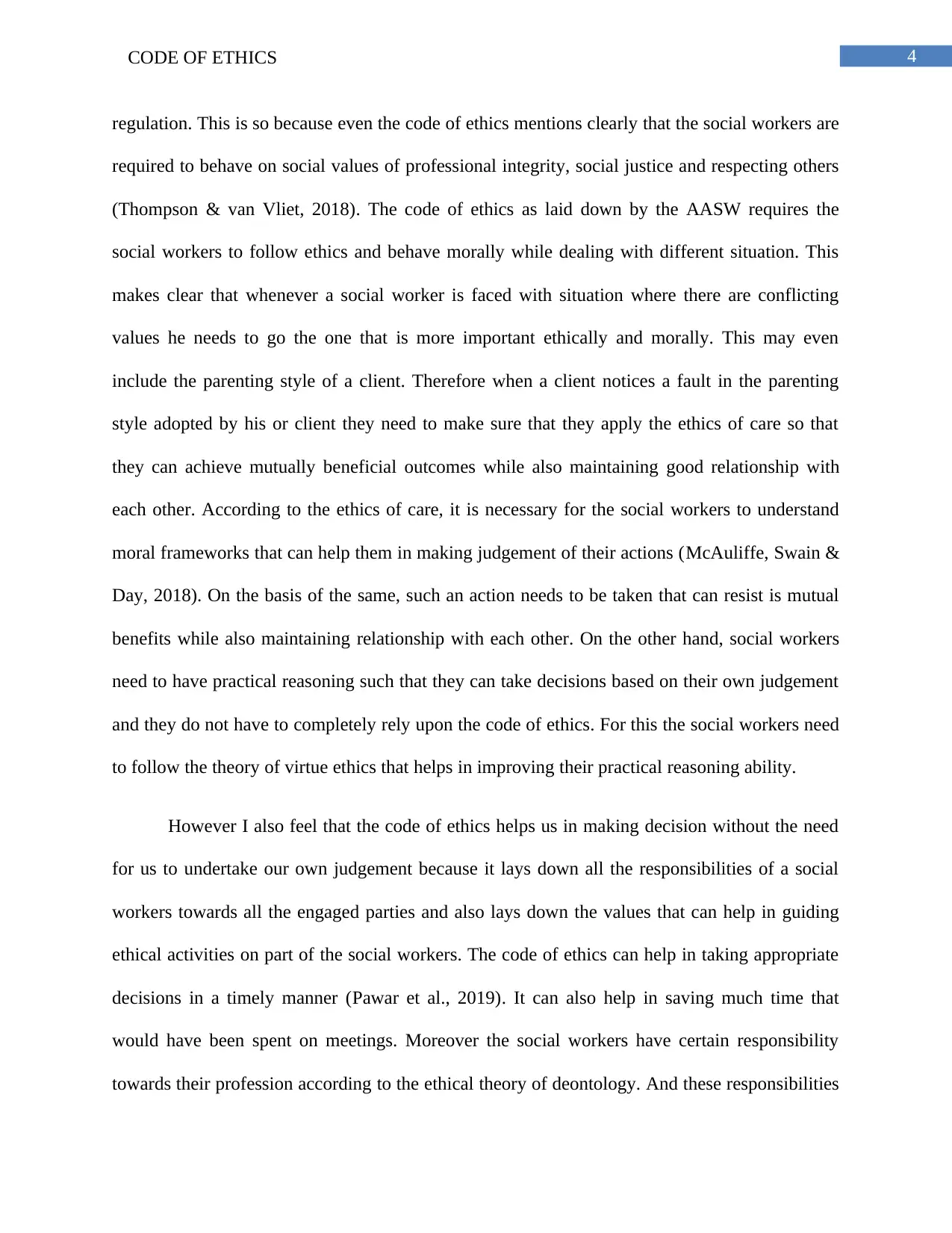
4CODE OF ETHICS
regulation. This is so because even the code of ethics mentions clearly that the social workers are
required to behave on social values of professional integrity, social justice and respecting others
(Thompson & van Vliet, 2018). The code of ethics as laid down by the AASW requires the
social workers to follow ethics and behave morally while dealing with different situation. This
makes clear that whenever a social worker is faced with situation where there are conflicting
values he needs to go the one that is more important ethically and morally. This may even
include the parenting style of a client. Therefore when a client notices a fault in the parenting
style adopted by his or client they need to make sure that they apply the ethics of care so that
they can achieve mutually beneficial outcomes while also maintaining good relationship with
each other. According to the ethics of care, it is necessary for the social workers to understand
moral frameworks that can help them in making judgement of their actions (McAuliffe, Swain &
Day, 2018). On the basis of the same, such an action needs to be taken that can resist is mutual
benefits while also maintaining relationship with each other. On the other hand, social workers
need to have practical reasoning such that they can take decisions based on their own judgement
and they do not have to completely rely upon the code of ethics. For this the social workers need
to follow the theory of virtue ethics that helps in improving their practical reasoning ability.
However I also feel that the code of ethics helps us in making decision without the need
for us to undertake our own judgement because it lays down all the responsibilities of a social
workers towards all the engaged parties and also lays down the values that can help in guiding
ethical activities on part of the social workers. The code of ethics can help in taking appropriate
decisions in a timely manner (Pawar et al., 2019). It can also help in saving much time that
would have been spent on meetings. Moreover the social workers have certain responsibility
towards their profession according to the ethical theory of deontology. And these responsibilities
regulation. This is so because even the code of ethics mentions clearly that the social workers are
required to behave on social values of professional integrity, social justice and respecting others
(Thompson & van Vliet, 2018). The code of ethics as laid down by the AASW requires the
social workers to follow ethics and behave morally while dealing with different situation. This
makes clear that whenever a social worker is faced with situation where there are conflicting
values he needs to go the one that is more important ethically and morally. This may even
include the parenting style of a client. Therefore when a client notices a fault in the parenting
style adopted by his or client they need to make sure that they apply the ethics of care so that
they can achieve mutually beneficial outcomes while also maintaining good relationship with
each other. According to the ethics of care, it is necessary for the social workers to understand
moral frameworks that can help them in making judgement of their actions (McAuliffe, Swain &
Day, 2018). On the basis of the same, such an action needs to be taken that can resist is mutual
benefits while also maintaining relationship with each other. On the other hand, social workers
need to have practical reasoning such that they can take decisions based on their own judgement
and they do not have to completely rely upon the code of ethics. For this the social workers need
to follow the theory of virtue ethics that helps in improving their practical reasoning ability.
However I also feel that the code of ethics helps us in making decision without the need
for us to undertake our own judgement because it lays down all the responsibilities of a social
workers towards all the engaged parties and also lays down the values that can help in guiding
ethical activities on part of the social workers. The code of ethics can help in taking appropriate
decisions in a timely manner (Pawar et al., 2019). It can also help in saving much time that
would have been spent on meetings. Moreover the social workers have certain responsibility
towards their profession according to the ethical theory of deontology. And these responsibilities
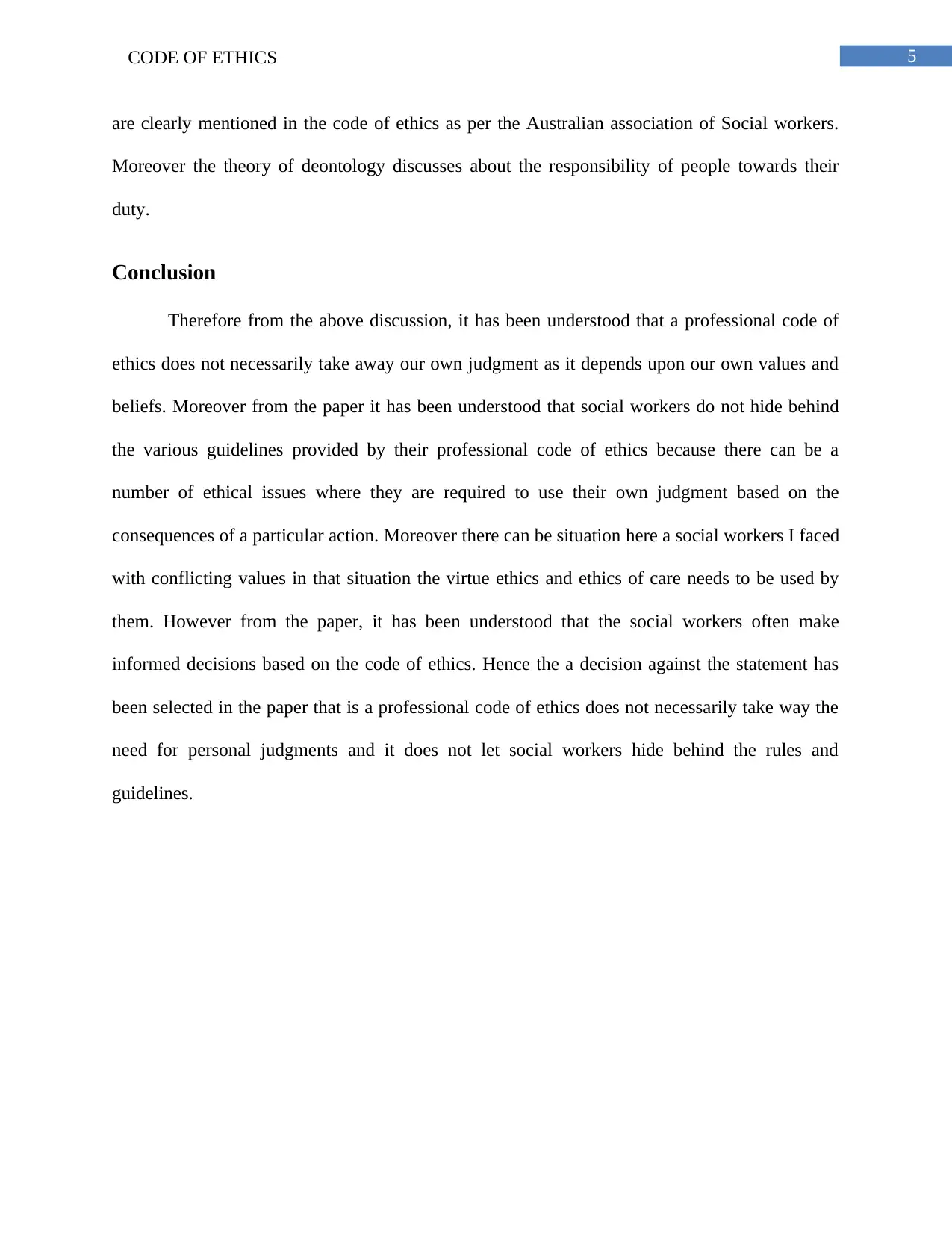
5CODE OF ETHICS
are clearly mentioned in the code of ethics as per the Australian association of Social workers.
Moreover the theory of deontology discusses about the responsibility of people towards their
duty.
Conclusion
Therefore from the above discussion, it has been understood that a professional code of
ethics does not necessarily take away our own judgment as it depends upon our own values and
beliefs. Moreover from the paper it has been understood that social workers do not hide behind
the various guidelines provided by their professional code of ethics because there can be a
number of ethical issues where they are required to use their own judgment based on the
consequences of a particular action. Moreover there can be situation here a social workers I faced
with conflicting values in that situation the virtue ethics and ethics of care needs to be used by
them. However from the paper, it has been understood that the social workers often make
informed decisions based on the code of ethics. Hence the a decision against the statement has
been selected in the paper that is a professional code of ethics does not necessarily take way the
need for personal judgments and it does not let social workers hide behind the rules and
guidelines.
are clearly mentioned in the code of ethics as per the Australian association of Social workers.
Moreover the theory of deontology discusses about the responsibility of people towards their
duty.
Conclusion
Therefore from the above discussion, it has been understood that a professional code of
ethics does not necessarily take away our own judgment as it depends upon our own values and
beliefs. Moreover from the paper it has been understood that social workers do not hide behind
the various guidelines provided by their professional code of ethics because there can be a
number of ethical issues where they are required to use their own judgment based on the
consequences of a particular action. Moreover there can be situation here a social workers I faced
with conflicting values in that situation the virtue ethics and ethics of care needs to be used by
them. However from the paper, it has been understood that the social workers often make
informed decisions based on the code of ethics. Hence the a decision against the statement has
been selected in the paper that is a professional code of ethics does not necessarily take way the
need for personal judgments and it does not let social workers hide behind the rules and
guidelines.
⊘ This is a preview!⊘
Do you want full access?
Subscribe today to unlock all pages.

Trusted by 1+ million students worldwide
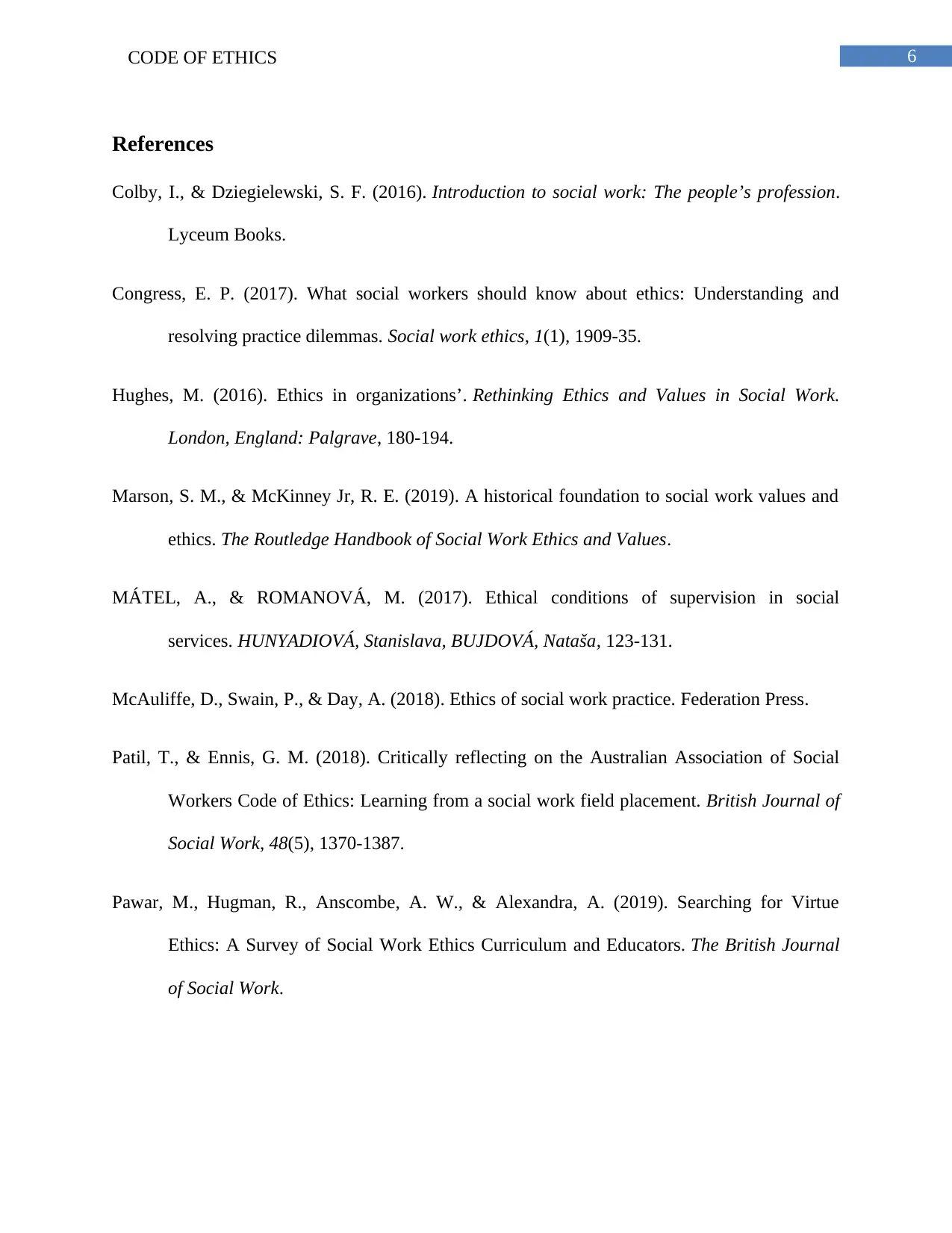
6CODE OF ETHICS
References
Colby, I., & Dziegielewski, S. F. (2016). Introduction to social work: The people’s profession.
Lyceum Books.
Congress, E. P. (2017). What social workers should know about ethics: Understanding and
resolving practice dilemmas. Social work ethics, 1(1), 1909-35.
Hughes, M. (2016). Ethics in organizations’. Rethinking Ethics and Values in Social Work.
London, England: Palgrave, 180-194.
Marson, S. M., & McKinney Jr, R. E. (2019). A historical foundation to social work values and
ethics. The Routledge Handbook of Social Work Ethics and Values.
MÁTEL, A., & ROMANOVÁ, M. (2017). Ethical conditions of supervision in social
services. HUNYADIOVÁ, Stanislava, BUJDOVÁ, Nataša, 123-131.
McAuliffe, D., Swain, P., & Day, A. (2018). Ethics of social work practice. Federation Press.
Patil, T., & Ennis, G. M. (2018). Critically reflecting on the Australian Association of Social
Workers Code of Ethics: Learning from a social work field placement. British Journal of
Social Work, 48(5), 1370-1387.
Pawar, M., Hugman, R., Anscombe, A. W., & Alexandra, A. (2019). Searching for Virtue
Ethics: A Survey of Social Work Ethics Curriculum and Educators. The British Journal
of Social Work.
References
Colby, I., & Dziegielewski, S. F. (2016). Introduction to social work: The people’s profession.
Lyceum Books.
Congress, E. P. (2017). What social workers should know about ethics: Understanding and
resolving practice dilemmas. Social work ethics, 1(1), 1909-35.
Hughes, M. (2016). Ethics in organizations’. Rethinking Ethics and Values in Social Work.
London, England: Palgrave, 180-194.
Marson, S. M., & McKinney Jr, R. E. (2019). A historical foundation to social work values and
ethics. The Routledge Handbook of Social Work Ethics and Values.
MÁTEL, A., & ROMANOVÁ, M. (2017). Ethical conditions of supervision in social
services. HUNYADIOVÁ, Stanislava, BUJDOVÁ, Nataša, 123-131.
McAuliffe, D., Swain, P., & Day, A. (2018). Ethics of social work practice. Federation Press.
Patil, T., & Ennis, G. M. (2018). Critically reflecting on the Australian Association of Social
Workers Code of Ethics: Learning from a social work field placement. British Journal of
Social Work, 48(5), 1370-1387.
Pawar, M., Hugman, R., Anscombe, A. W., & Alexandra, A. (2019). Searching for Virtue
Ethics: A Survey of Social Work Ethics Curriculum and Educators. The British Journal
of Social Work.
Paraphrase This Document
Need a fresh take? Get an instant paraphrase of this document with our AI Paraphraser
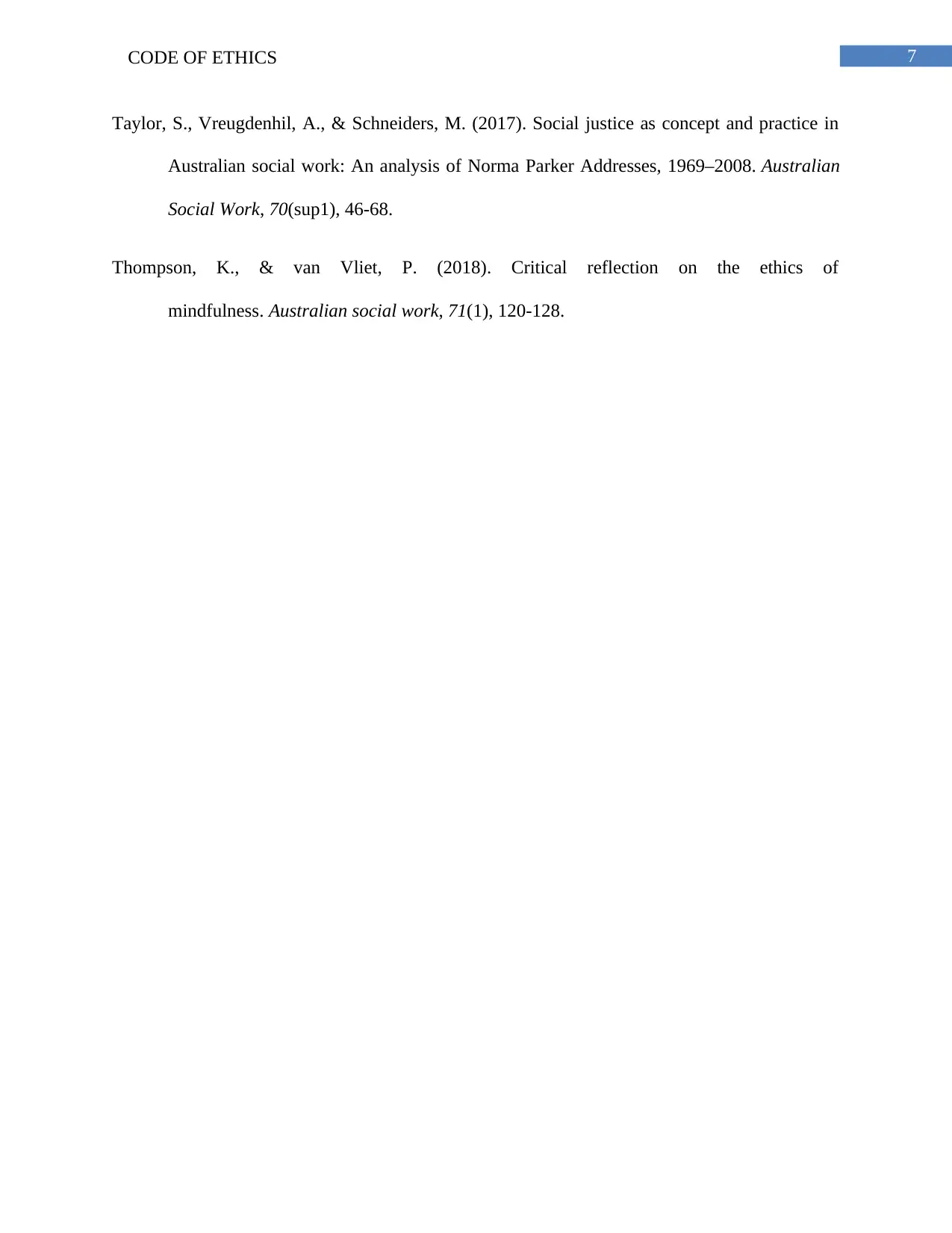
7CODE OF ETHICS
Taylor, S., Vreugdenhil, A., & Schneiders, M. (2017). Social justice as concept and practice in
Australian social work: An analysis of Norma Parker Addresses, 1969–2008. Australian
Social Work, 70(sup1), 46-68.
Thompson, K., & van Vliet, P. (2018). Critical reflection on the ethics of
mindfulness. Australian social work, 71(1), 120-128.
Taylor, S., Vreugdenhil, A., & Schneiders, M. (2017). Social justice as concept and practice in
Australian social work: An analysis of Norma Parker Addresses, 1969–2008. Australian
Social Work, 70(sup1), 46-68.
Thompson, K., & van Vliet, P. (2018). Critical reflection on the ethics of
mindfulness. Australian social work, 71(1), 120-128.
1 out of 8
Related Documents
Your All-in-One AI-Powered Toolkit for Academic Success.
+13062052269
info@desklib.com
Available 24*7 on WhatsApp / Email
![[object Object]](/_next/static/media/star-bottom.7253800d.svg)
Unlock your academic potential
Copyright © 2020–2026 A2Z Services. All Rights Reserved. Developed and managed by ZUCOL.





